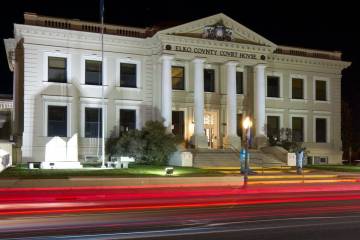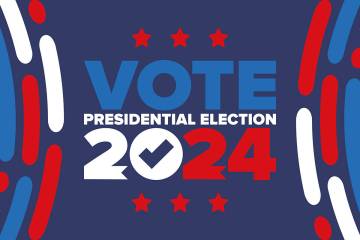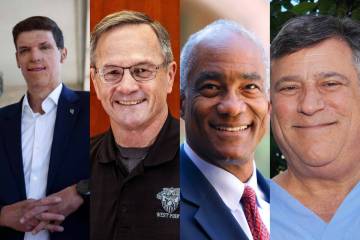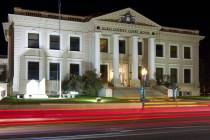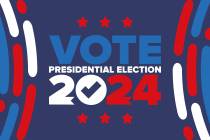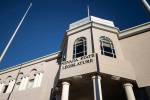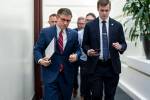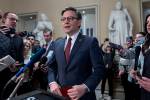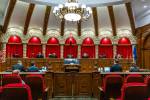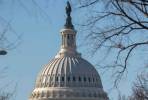Tax hike sprints to finish
CARSON CITY -- The Legislature passed a $781 million tax increase and delivered it to Gov. Jim Gibbons on Friday, barely meeting a 5 p.m. deadline and setting the stage for Gibbons' expected veto.
After intense negotiations between Republicans and Democrats, the tax package finally came to a vote in the state Senate late Friday afternoon, winning approval by a 17-4 margin. All 12 Democrats plus five Republicans voted for the bill.
It then was rushed across the building to the Assembly, which had already held a pre-emptive debate on the provisions to raise the rates of existing sales, payroll, vehicle and business license taxes. The Assembly swiftly passed the bill 29-13, with all 28 Democrats plus Assemblyman John Carpenter, R-Elko, in favor.
Trailed by a pack of reporters, photographers and cameramen, legislative staffer Lauren Soper carried the bill across the courtyard separating the legislative building from the Capitol and into the reception area of Gibbons' office. Gibbons emerged to take possession of the bill and address the media about 4:30 p.m.
Thanking legislators for "doing their job," Gibbons said he needed to spend some time looking over the bill but had little doubt about how he would act on it.
"A billion-dollar tax increase in a recession is the worst thing we can do for the American and the Nevada people, and most of all for the hard-working families of this state," Gibbons said. "I intend to veto this bill."
Gibbons has five days to issue his veto, not counting Sunday. He wouldn't say when he plans to do so.
Once he does, the bill goes back to the Legislature, where the same two-thirds supermajority needed to pass a tax increase is required to override a governor's veto. The legislative session must end by June 1.
The tax increases were needed to bridge the gap between projected revenues for the next biennium and the $6.8 billion in spending legislators have approved. (This approved spending is more than the governor's proposed budget of $6.3 billion, more than actual spending in the current biennium of about $6.3 billion, and about the same as the budget approved by lawmakers two years ago. It is less than the estimated $8.1 billion it would take to maintain current service levels.)
The bills authorizing the spending also saw final passage through the Legislature on Friday.
Though the specific tax increases in the bill were endorsed by Democratic and Republican leaders days ago, side issues stalled the process. Republicans said they would not vote for the taxes without reforms to public employee pensions and a provision guaranteeing the tax hikes will expire in two years.
The parties reached a compromise on the pension reforms but hadn't yet approved that legislation Friday. After trying to come up with an alternative to the sunset clause for the tax hikes, Senate Majority Leader Steven Horsford, D-Las Vegas, finally gave in, saying passing the bill was too important to let relatively minor issues hold it up.
Horsford also agreed to remove a provision from the bill that would have authorized a commission to look for ways to implement a broad-based tax on Nevada businesses. Senate Minority Leader Bill Raggio, R-Reno, said he also wanted a tax study but wanted to leave it open-ended.
"It is more important to fund the budget than to continue to disagree in this chamber," Horsford said. He and Raggio pledged to work together on a separate bill authorizing the desired study.
WAITING ON THE SENATE
Getting the tax bill to the floor of the Senate was the culmination of a week of arduous work.
The two-thirds vote requirement meant the majority Democrats, who make up 12 of the upper house's 21 members, needed at least two Republicans on board to pass their tax package. (Democrats comprise two-thirds of the 42 Assembly members.)
That made for a tense dynamic. Democrats, being the ones in charge, felt their wishes should take precedence and did not want to be seen selling out the public employee unions who are loyal to them. Republicans, being the ones with the needed votes, were determined to extract their concessions, particularly the pension reforms for which business interests have spent months lobbying and campaigning.
Leaders of both parties from both houses engaged in weeks of marathon negotiating sessions behind closed doors. They agreed to furloughs for state workers, cuts to K-12 education and a higher education budget that, while $300 million richer than Gibbons' proposal, still trims the state's colleges and universities by 12.5 percent. More than $1 billion was cut from state services for the next two years.
But when it came to how to pay for the $6.8 billion in proposed spending, the tussling only got more intense. Matters reached an ugly impasse after a long and contentious Wednesday night.
At 2:30 a.m. Thursday, Horsford compelled all senators back to the floor, by force if necessary, and kept them there until 4 a.m., prompting angry complaints by Republicans that he was trying to bully their votes out of them.
Horsford recited the pension reform proposals Democrats had offered. He said they were significant but Republicans were refusing to compromise and endangering education funding by doing so.
Later Thursday, weary senators finally reached an agreement on the reforms. But the deal still was not done.
On Friday, the issues were whether the new taxes should expire after two years and how a commission should study the state's tax structure over the next two years, so that the next Legislature might make more lasting changes to a revenue stream that leans heavily on sales and gaming taxes to fund state government.
From the beginning, Raggio said on the Senate floor, "I indicated that for me to vote for and approve any tax plan, that not only would it have to be on existing taxes, but these taxes would have to be temporary."
Democrats proposed a weaker sunset provision that would make the tax hikes expire only if the economy improves to the point where the revenue is no longer needed.
Raggio said it was not enough. He also took issue with Horsford's proposed study commission.
Hours went by, the deadline loomed. Some began to fear the worst.
Finally, at 3:30 p.m., Horsford introduced an amendment giving Raggio the hard sunsets but keeping the directed commission. When Raggio again took issue with the commission, Horsford removed it from the bill.
"It is more important to meet our obligations to the state of Nevada than it is to have differences about the language in a study," Horsford said. "I will concede deleting the provisions in the amendment so we can fund education in Nevada."
The amendment approved, it was time, around 4 p.m., to vote on the tax bill.
Sen. Barbara Cegavske, R-Las Vegas, said she was concerned businesses would be forced to lay people off by the 0.54 percent increase levied on payrolls above $250,000 annually.
At a time when unemployment is at a 25-year high, she said, "I am very concerned about what we are doing to our economy. ... I do believe this is a job-killing tax and a business-killing tax."
Cegavske and fellow Republicans Mark Amodei of Carson City, Mike McGinness of Fallon and Maurice Washington of Sparks voted against the bill.
RUSH TO THE ASSEMBLY
Seeing the clock winding down earlier Friday afternoon, Assembly Speaker Barbara Buckley, D-Las Vegas, decided she couldn't wait on the Senate. She opened debate on the tax package even though there was no bill before the Assembly.
Buckley opened the debate by saying times have never been worse for business, but legislators simply could not cut public school and higher education at the levels Gibbons requested.
"We can't let them (prisoners) out because we have a shortfall," she said. "We can't cut human services caseloads. We can't cut education. We can trot out the platitude that government has to live within its means and 'no new taxes.' But when 50 percent of our budget is education, you can't cut it by 44 percent."
Assembly Minority Leader Heidi Gansert, R-Reno, had helped negotiate the budget and tax package. She said she has a diverse caucus and some of the members backed parts of the tax plan, but they could not support the entire package.
Assemblyman Ty Cobb, R-Reno, said half the employees in the company where he works have been laid off. "We can't add to the burden they face if we ever expect a turnaround in our economy," Cobb said.
Six minutes after the Senate passed the tax package, it came to a vote in the Assembly. Buckley said any more comments could wait until afterward, and the 29-13 vote assured the bill's passage.
As the bill was being sprinted over to Gibbons' office, Carpenter, the only Republican to back the taxes, spoke, saying it was the toughest decision of his life.
"If my career was not at an end, this might have brought it to an end," said Carpenter, a 22-year legislator who cannot run again because of term limits. But he said his goal throughout his career has been to improve schools and colleges and reduce the sizes of school classes.
His own children and grandchildren have received fine educations, he added, and all children should have an opportunity for a quality education. "Most of all I asked the Lord," Carpenter said. "The Lord said: 'This is the thing you should do. Tonight you are going to sleep and sleep well.'"
Members, including Republicans, gave Carpenter a standing ovation.
NOW WHAT?
Because Friday was also a deadline for bills to pass their second legislative house, lawmakers remained in floor session until about 9 p.m. in both houses, and both the Senate and Assembly are scheduled to hold floor sessions today.
Both houses, however, plan to take Sunday and Monday off, an unusual occurrence for the Nevada Legislature since Memorial Day always falls during the final week of the session.
Gibbons' veto could come anytime before Thursday, which should give the legislators four days to override the veto and end the session. But the votes needed for the veto override now also can be used as bargaining chips as lawmakers demand passage of other priorities.
Out of deference to the office of the governor, veto overrides by the Legislature have generally been rare, with the last one before Friday occurring 20 years ago. Earlier Friday, they overrode his veto on a bill increasing fees charged by the state engineer.
The major tasks for lawmakers now include passage of the pension reform package, currently stalled in the Senate Finance Committee, and the formulation of a tax study that both Horsford and Raggio can live with.
On Friday night, however, the feeling in the legislative building was one of overwhelming relief. Had the 5 p.m. deadline not been met, lawmakers had feared Gibbons might close his office and refuse to accept the tax bill until Tuesday, meaning by the time five days passed for the veto, there might not be time to override.
Now, it appears at least possible that the Legislature will finish in 120 days for the first time since 1999.
Contact reporter Molly Ball at mball@reviewjournal.com or 702-387-2919. Contact reporter Ed Vogel at evogel@reviewjournal.com or 775-687-3901.
Political Eye Blog






